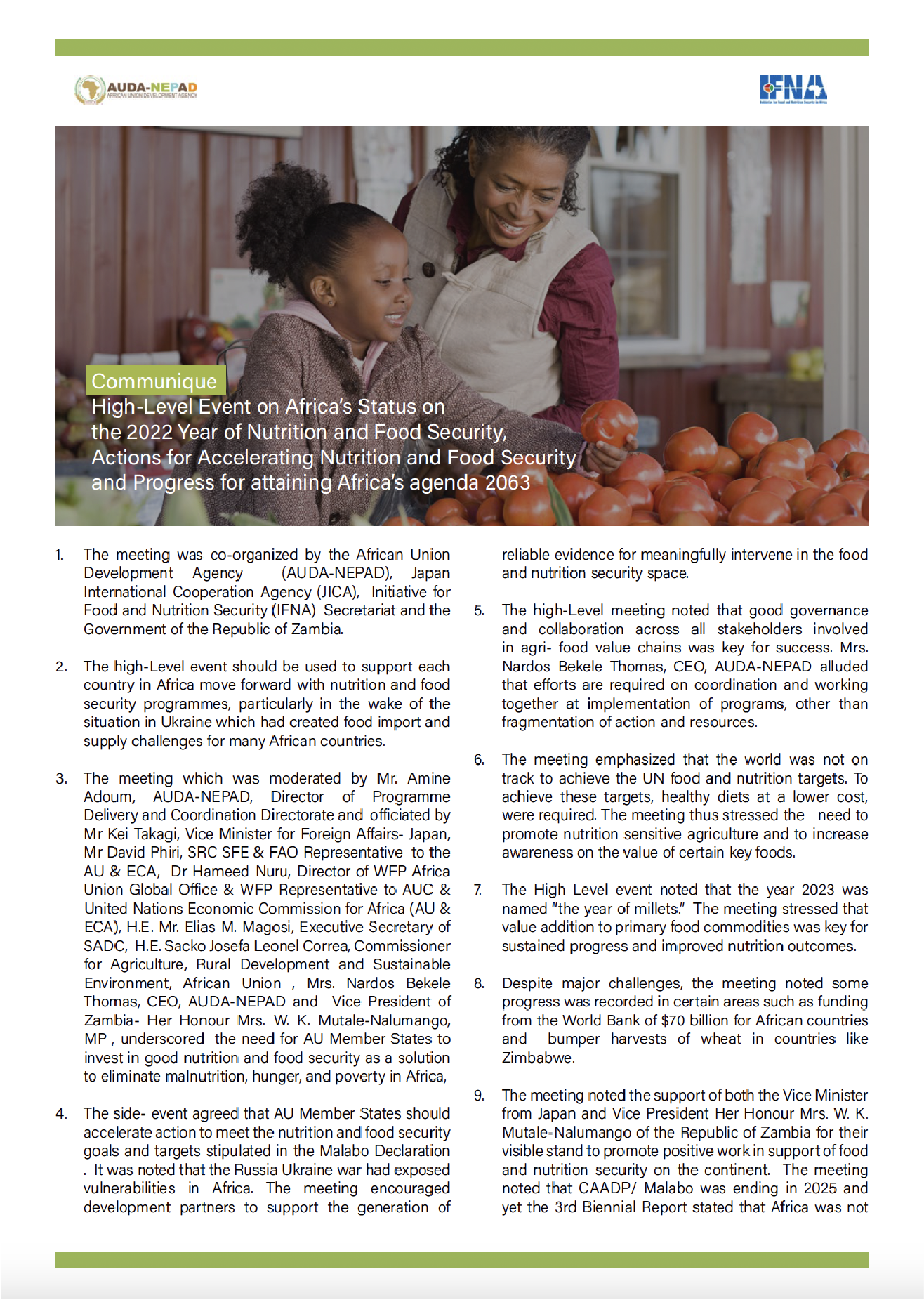- The meeting was co-organized by the African Union Development Agency (AUDA-NEPAD), Japan International Cooperation Agency (JICA), Initiative for Food and Nutrition Security (IFNA) Secretariat and the Government of the Republic of Zambia.
- The high-Level event should be used to support each country in Africa move forward with nutrition and food security programmes, particularly in the wake of the situation in Ukraine which had created food import and supply challenges for many African countries.
- The meeting which was moderated by Mr. Amine Adoum, AUDA-NEPAD, Director of Programme Delivery and Coordination Directorate and officiated by Mr Kei Takagi, Vice Minister for Foreign Affairs- Japan, Mr David Phiri, SRC SFE & FAO Representative to the AU & ECA, Dr Hameed Nuru, Director of WFP Africa Union Global Office & WFP Representative to AUC & United Nations Economic Commission for Africa (AU & ECA), H.E. Mr. Elias M. Magosi, Executive Secretary of SADC, H.E. Sacko Josefa Leonel Correa,Commissioner for Agriculture, Rural Development and Sustainable Environment, African Union , Mrs. Nardos Bekele Thomas, CEO, AUDA-NEPAD and Vice President of Zambia- Her Honour Mrs. W. K. Mutale-Nalumango, MP , underscored the need for AU Member States to invest in good nutrition and food security as a solution to eliminate malnutrition, hunger, and poverty in Africa,
- The side- event agreed that AU Member States should accelerate action to meet the nutrition and food security goals and targets stipulated in the Malabo Declaration . It was noted that the Russia Ukraine war had exposed vulnerabilities in Africa. The meeting encouraged development partners to support the generation of reliable evidence for meaningfully intervene in the food and nutrition security space.
- The high-Level meeting noted that good governance and collaboration across all stakeholders involved in agri- food value chains was key for success. Mrs. Nardos Bekele Thomas, CEO, AUDA-NEPAD alluded that efforts are required on coordination and working together at implementation of programs, other than fragmentation of action and resources.
- The meeting emphasized that the world was not on track to achieve the UN food and nutrition targets. To achieve these targets, healthy diets at a lower cost, were required. The meeting thus stressed the need to promote nutrition sensitive agriculture and to increase awareness on the value of certain key foods.
- The High Level event noted that the year 2023 was named “the year of millets.” The meeting stressed that value addition to primary food commodities was key for sustained progress and improved nutrition outcomes.
- Despite major challenges, the meeting noted some progress was recorded in certain areas such as funding from the World Bank of $70 billion for African countries and bumper harvests of wheat in countries like Zimbabwe.
- The meeting noted the support of both the Vice Minister from Japan and Vice President Her Honour Mrs. W. K. Mutale-Nalumango of the Republic of Zambia for their visible stand to promote positive work in support of food and nutrition security on the continent. The meeting noted that CAADP/ Malabo was ending in 2025 and yet the 3rd Biennial Report stated that Africa was not on track to meet nutrition and food security and hunger targets.
- The side-event acknowledged that the continent faces shocks, conflicts, climate change, land disputes and other challenges all of which are causes of malnutrition which need to be addressed.
- The meeting stressed that there was need to provide resources to AUDA NEPAD to address this issue of malnutrition and hunger in the continent and accelerate the implementation of Malabo Declaration on hunger and malnutrition.
- The meeting noted that one the of the key ingredients of success in the important work of food and nutrition security was coordination. She emphasized that Food production was key for nutrition. The meeting thanked Zambia’s Vice President for advocating for a holistic approach to ending hunger and malnutrition in Africa. The meeting noted that Africa had enough declarations, decisions from Maputo, Malabo to Dakar, that stressed the importance of ending hunger and malnutrition.
- The meeting emphasized that there was need to address the unemployment of youth and women in the continent. It was agreed that the youth on the continent face hopelessness and have become a threat to society.
- The meeting agreed that CAADP was a complete strategy and Africa just needs to revise it and align with existing frameworks such as the Africa Common Position for UN Food Systems. There was need to stop wasting time developing unnecessary strategies. The big work is to feed Africa and free it from malnutrition and food insecurity.
- The meeting thanked the Government of Japan for their interest in working with AUDA-NEPAD and AUC/ARBE.
- RECOMMENDATIONS:
- There is need for further capacity building to assist some member states to improve their data integrity systems.
- There is need for increased investment in improved coordination of food and nutrition issues on the continent.
- The activities on food and nutrition security should focus on youth and women and seek to promote Public-Private Partnership as a modality for doing business.
- Countries should deal with high wasting, stunting, underweight and high anemia levels
- Countries should seek to promote good nutrition by taking opportunity of key Commitments already made by Governments, availability of policies, Food Based Dietary Guidelines, focus on Food Safety.
- Emphasize a multisectoral approach to tackling hunger and malnutrition issues.

